Grease stains on kitchen cloths can be tough to get rid of. But, with the right steps, you can remove them effectively. The first step is to treat the stain before washing. This process includes pretreat, wash, and dry steps.
The pretreatment step is key to removing grease from towels. You can use shampoo, laundry detergent, dish soap, cornstarch, or talcum powder. After applying the pretreatment, wash the towel in hot water. This helps remove the grease and sanitizes the cloth.
By following these steps, you can remove grease stains from your kitchen towels. This keeps them fresh and odor-free. Also, remember to prevent grease stains by avoiding fabric softeners and using less detergent.
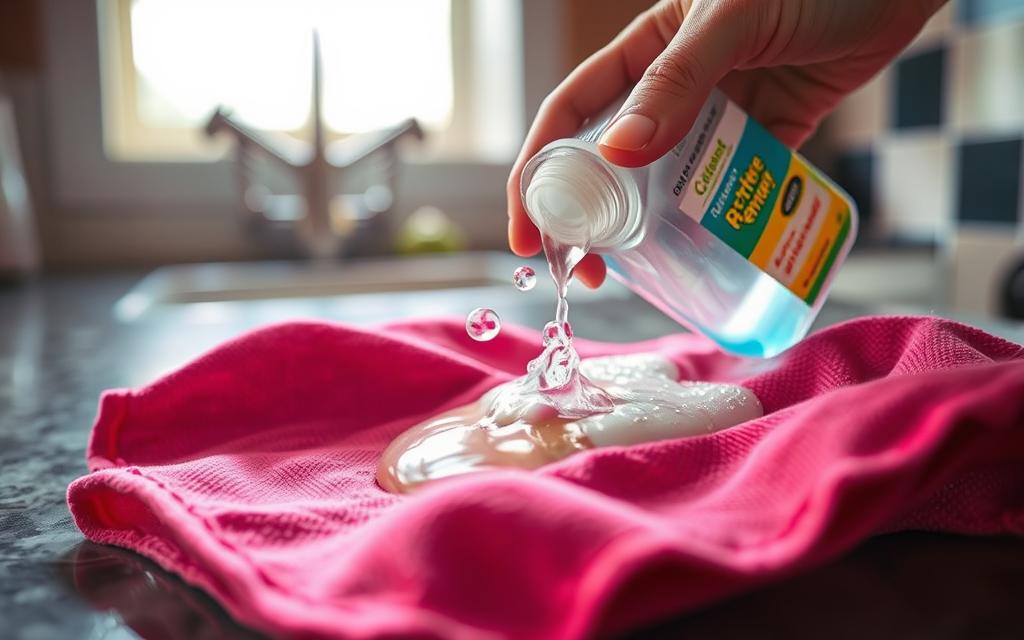
Key Takeaways
- Pretreatment is crucial for effectively removing grease stains from kitchen cloths.
- Hot water is essential for washing and sanitizing greasy towels.
- Avoid fabric softeners and use less detergent to prevent grease buildup in the future.
- Baking soda, vinegar, and ammonia are effective solutions for degreasing and odor removal.
- Proper drying techniques, such as air-drying in the sun, can help maintain stain-free kitchen cloths.
Understanding Grease Stains
Grease stains are common in kitchens. They come from oils and fats in cooking and food prep. Stains from sizzling meat, splattering oils, or dripping salad dressings can stick to kitchen linens.
What Causes Grease Stains?
Grease stains happen when fatty compounds from food or cooking surfaces get on fabric. These lipids can go deep into fibers, making them hard to clean. The sooner you treat a grease stain, the better it is to remove.
Common Sources of Grease in the Kitchen
- Cooking oils, such as olive, vegetable, or canola oil
- Butter and other dairy-based fats
- Meat drippings and juices
- Salad dressings and marinades
- Sauces and gravies
Knowing how grease stains form helps in finding good treatments. With the right methods and products, you can handle tough grease stains. This keeps your kitchen linens looking great.

“Grease is hard to wash off because it is a lipid and insoluble in water. Detergent can effectively remove grease stains from clothes.”
The Importance of Quick Action
Removing stubborn grease stains from kitchen cloths is all about timing. Fresh stains are much easier to deal with than old ones. The sooner you clean a grease spill, the better your chances of getting rid of it completely.
Quick action helps prevent the grease from sticking to the fabric. This makes it simpler to remove the stain without leaving a mark.
Why Timing Matters
Grease stains that dry out become much harder to remove. The heat makes the stain set, making it tough to get rid of without special cleaning methods. Acting fast is key to keeping your kitchen cloths looking new.
Stains That Set In
- Grease stains that have been machine dried are very hard to remove.
- Older, dried-out stains need strong cleaning, like commercial degreasers or baking soda paste.
- Set-in stains might need several treatments and long soaking to remove the grease.
Don’t let grease stains stay on your kitchen cloths. Quick action can stop them from becoming a big problem. With the right cleaning methods, your kitchen linens will stay in great shape.
Basic Cleaning Supplies You’ll Need
To get rid of tough grease stains on your kitchen cloth, you need the right cleaning products. You might think you need special stain removers, but many common items work just as well. These items can help you remove grease marks easily and affordably.
Common Household Products
Begin with the basics: dish soap, white vinegar, baking soda, and cornstarch. These simple items can be mixed in different ways to make effective homemade grease removers. For example, a baking soda and water paste can be used to gently scrub stains before washing.
Rubbing alcohol is also a great product to have. Mix it with salt in a 4:1 ratio for a strong degreaser. This mix works well on tough stains on carpets or rugs.
Specialized Stain Removers
For really tough grease stains, it’s good to have a specialized stain remover ready. Products like OxiClean or Persil can be very effective. Always read the instructions and test on a small area first.
Hot water is key for removing grease. Don’t use bleach on colored fabrics, as it can change their color. Having different cleaning supplies helps you deal with any grease stain on your kitchen cloth.
| Cleaning Product | Recommended Use | Effectiveness |
|---|---|---|
| Dish Soap | Pretreatment for grease stains on clothes and linens | Highly effective |
| Baking Soda + Water | Paste for scrubbing grease stains on hard surfaces | Moderately effective |
| Salt + Rubbing Alcohol | Degreasing solution for carpets and rugs | Highly effective |
| White Vinegar | Soaking tough, caked-on grease stains | Highly effective |
| Specialized Stain Removers (OxiClean, Persil) | Treating stubborn grease stains on fabrics | Highly effective |
“Having a variety of cleaning supplies on hand allows for flexibility in treating different types of grease stains.”
Pre-Treating the Stain
Removing grease stains from kitchen cloths quickly is key. Start by blotting the stain with a clean paper towel. This helps soak up as much grease as you can. Don’t rub the stain, as it can spread it further into the fabric.
Blotting the Stain
After blotting, you can make a homemade stain treatment. Mix a few drops of dish soap with warm water for a sudsy solution. Apply it to the stain and let it sit for 15-30 minutes before washing.
For tougher grease stains, try a paste of baking soda and water. Use a soft-bristled brush to work it into the fabric.
Making a Homemade Stain Treatment
- Mix a few drops of dish soap with warm water to create a sudsy solution.
- Apply the solution directly to the grease stain and let it sit for 15-30 minutes.
- For stubborn stains, make a paste with baking soda and water, then use a soft-bristled brush to work it into the fabric.
By pre-treating the stain with these simple, homemade solutions, you’ll be well on your way to removing those pesky grease marks. This will keep your kitchen cloths looking their best.
Washing Techniques for Different Fabrics
When washing kitchen towels, the fabric type is key. Cotton towels can take tough cleaning, but synthetic ones need care. Knowing your towels’ material helps remove grease and keeps them clean.
Cotton Kitchen Cloths
Cotton towels can handle hot water and strong detergents well. Wash them in the hottest water safe for cotton, with a heavy-duty detergent. This combo breaks down grease effectively. Don’t use fabric softener, as it can trap grease.
Synthetic Kitchen Cloths
Synthetic towels, like polyester or nylon, need gentle care. Wash them in warm water with a mild detergent. Hot water and harsh cleaners can harm them. Also, skip fabric softener and add white vinegar to the rinse for extra cleaning power.
Quick action is vital when grease stains happen. The sooner you clean, the easier it is to remove the stain. Knowing how to wash different fabrics ensures your towels are ready for your next cooking project.
Effective Methods for Stain Removal
Dealing with stubborn grease stains on kitchen cloths can be tough. But, there are a few methods that really work. You can use simple household items or specialized degreasers to get your fabrics looking new again.
Dish Soap Method
The dish soap method is easy and effective. Just put a bit of dish soap on the stain, rub it in gently, and wait a few minutes. Then, wash it as usual. The dish soap’s ingredients help break down the grease, making it easier to clean.
Baking Soda Paste Method
The baking soda paste method is another natural way to tackle grease stains. Mix baking soda with water to make a thick paste. Apply it to the stain and let it sit for 30 minutes to an hour. This allows the baking soda to soak up the grease.
Commercial Degreasers
For really tough stains, try using commercial degreasers like Simple Green or CitriSolve. These products are made to dissolve grease and oil. Always test a small area first to make sure they won’t harm your fabric.
It’s important to act fast when you see a grease stain. The longer it sits, the harder it is to get rid of. With the right treatment and some effort, you can keep your kitchen cloths looking great.
Rinsing and Drying Your Cloth
After dealing with grease stains on your kitchen linens, the next step is important. You need to rinse and dry them right. This ensures no oil is left behind and prevents bad smells. Here’s how to rinse and dry your cloths well.
Proper Rinse Techniques
Rinsing the cloth well is key to remove cleaning solution or stain treatment. Run it under hot water to get rid of soap or baking soda. This step stops chemicals from damaging the fabric or causing color changes.
Best Practices for Drying
- Air drying in direct sunlight is great for breaking down grease and odors. The sun’s UV rays naturally bleach and deodorize.
- If using a dryer, choose the highest safe heat setting. Don’t dry if stains are still there, as heat can set them.
- For delicate fabrics, use a mesh laundry bag. It keeps the cloth from getting caught and worsening stains.
Drying properly is key to keep your kitchen linens fresh and grease-free. By rinsing and drying correctly, your cloths will be ready for their next use. They’ll be free from oil stains and smells.
Tips for Maintaining Stain-Free Kitchen Cloths
To keep your kitchen cloths grease-free, you need to be consistent. Simple habits can help your cloths last longer and keep your kitchen clean. This makes cooking a healthier experience.
Regular Cleaning Habits
Wash your kitchen cloths every day if they get a lot of use. Don’t use greasy cloths again without washing them first. This stops grease stains from getting worse and keeps your kitchen clean.
Storage Tips to Avoid Grease Build-Up
- Keep clean kitchen cloths in a dry, well-ventilated spot to stop grease and moisture buildup.
- Have a special set of cloths for greasy jobs like cleaning the stovetop or wiping spills.
- Switch out your kitchen cloths often to avoid too much grease on one cloth.
Looking after your kitchen cloths properly is key. Regular washing and smart storage keep them stain-free. By following these tips, you can have a grease-free kitchen and keep your cloths working well.
Handling Stubborn Stains
Stubborn grease stains can be tough to remove. You might need to repeat the cleaning steps a few times. Soak the cloth in a mix of oxygen-based bleach and water before washing again. This can help break down the stain.
Enzymatic cleaners made for grease stains are also great. They can be a powerful tool in your cleaning arsenal.
Re-treating Stains
If the first cleaning doesn’t work, don’t worry. You can try again with your homemade or commercial stain remover. Be patient and let the cleaner work its magic. Keep washing until the stain is gone.
When to Seek Professional Help
For really tough stains or delicate fabrics, it’s wise to see a professional dry cleaner. They have the right tools and solutions to remove stains without harming the fabric. This is a good idea for valuable or special kitchen towels.
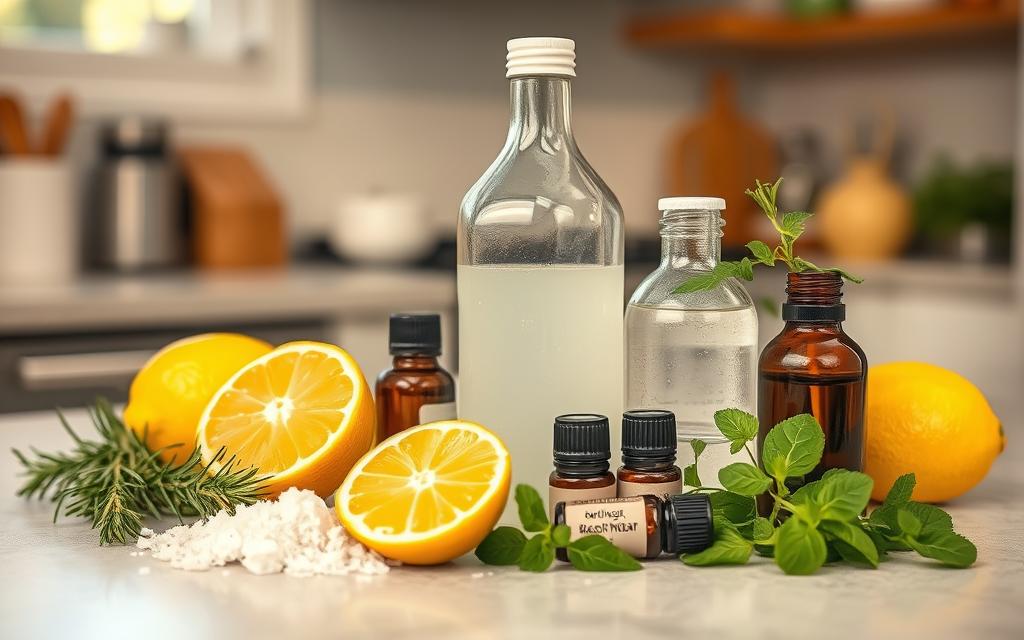
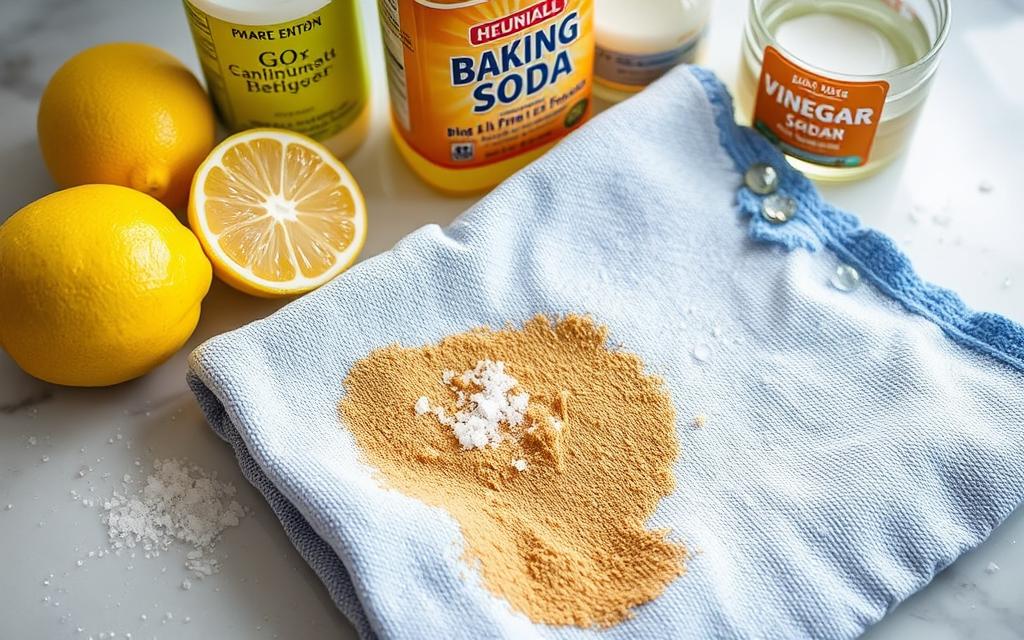
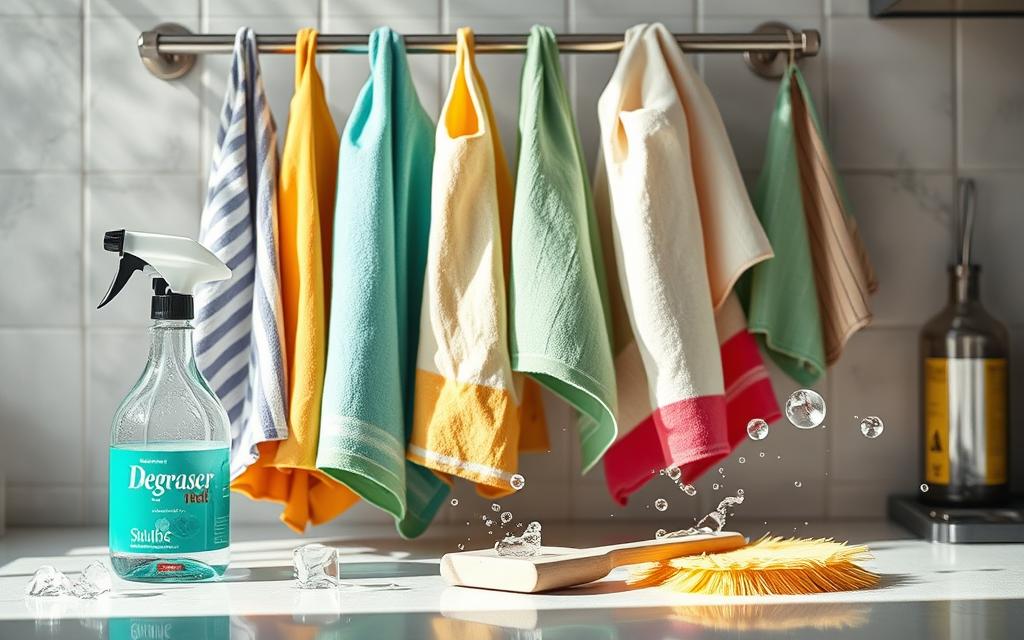
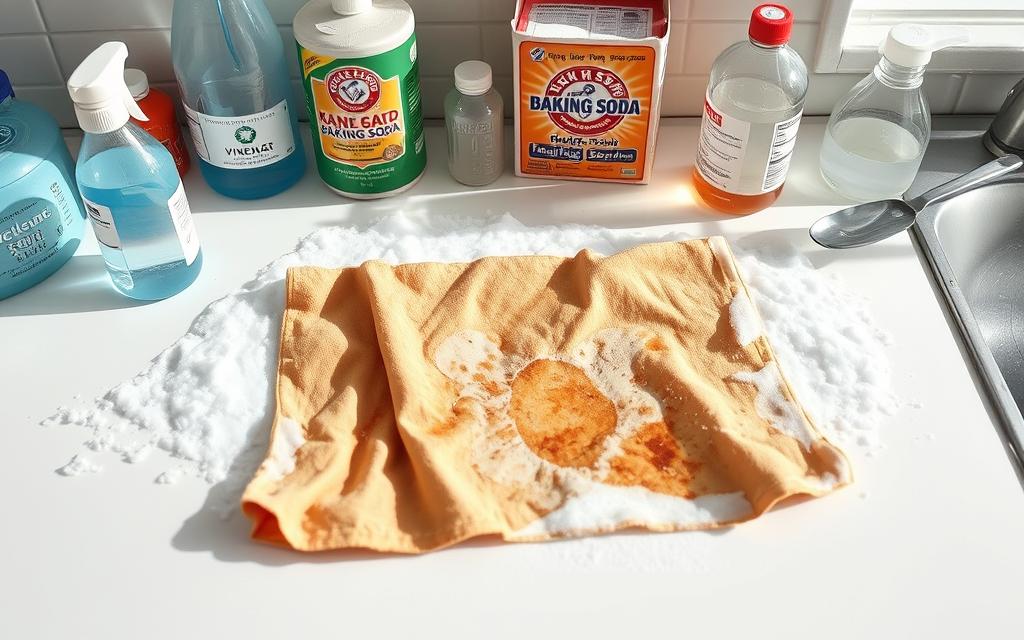
Leave a Reply